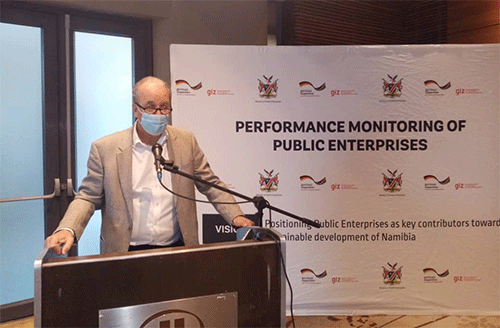The public enterprises ministry yesterday officially launched their much-awaited Public Enterprises Financial Monitoring System, which is a digital system designed in collaboration with the German development agency, GIZ. The digitised system, which will enable the public enterprises ministry and government in general to make more rational and sensible decisions based on more reliable and up-to-date data, was funded by GIZ to the tune of N$38 million.
Public enterprises play a crucial role in the domestic economy and actually make up a dominant sector in Namibia. However, many public enterprises depend on government for financial input and bailouts, making their continued operation unsustainable.
“With the new system, we will be basing decisions on real time, accurate data, thereby enhancing the quality of our decision-making,” said public enterprises minister Leon Jooste at the launch. He added in the past, poor and outdated available data made it difficult for government to make effective decisions for the country’s public enterprises, which have a combined asset base of more than N$100 billion.
Jooste also noted that in exercising the ministry’s functions, the amount and quality of data is paramount.
He said one of the first things he realised when the ministry was created in 2015 was that very little data was available and that much of the data was old or inaccurate.
“As a ministry, we also agreed very early on that we will be embracing technology to complement our efforts and after assessing various expensive enterprise based software solutions, we decided to embark on a process to develop our own system. We then started to gather our own data and our Corporate Advisory Reform Unit collected a massive amount of data that was entered into an Excel based spreadsheet called Public Enterprises Monitoring and Evaluation System (PEMES). PEMES immediately elevated our ability to exercise our functions purely because we now had access to accurate information to analyse the performance of our entities and to have a more accurate insight into their challenges,” Jooste explained.
However, PEMES was a manual system where information had to be manually gathered and then entered into the system.
Said Jooste: “The GIZ, fortunately, came to our aid and collaborated with the ministry to develop the web-based, multi-user access database known as the Public Enterprises Financial Monitoring System. This system allows various public enterprises to upload their data, whereafter dedicated MPE staff crosscheck the information for accuracy before approving or declining the information on the system. The system was deliberately developed to be user-friendly and requires only about five minutes to upload the information. This results in less of a burden on our public enterprises, freeing up time to attend to their core operational matters.”
GIZ’s project manager for the monitoring system John Steytler noted it “will contribute to sustainable economic development” but more importantly, will assist the ministry with basic governance procedures, will digitise a previously manual system and will provide greater capacity for evaluating commercial State-owned-enterprises.
“The over-dependence of many public enterprises on the national budget is unsustainable and so is the fact that more public enterprises are becoming more reliant on the treasury,” said Steytler. He further pointed out that besides the good performing SOEs of MTC and Nampower, the rest of the public enterprises during the last six years actually made a combined loss of more than N$1 billion.
Steytler emphasised that for this reason, public enterprise reforms feature prominently in the second Harambee Prosperity Plan (HPPII). Through GIZ, the aim is to improve accountability and financial performance, decrease the national debt and improve competition. He continued that more than 40 employees at several public enterprises have been trained and are already implementing the new system as part of their management procedures in their individual companies as it has now become compulsory for them to do so.
During yesterday’s welcoming remarks, acting executive director in the public enterprises ministry Ndiitah Nghipondoka-Robiati explained that part of the overall exercise is to transform the country’s public enterprises. “This is an important milestone in the operationalisation of the public enterprises performance monitoring system,” she said.
- ebrandt@nepc.com.na


